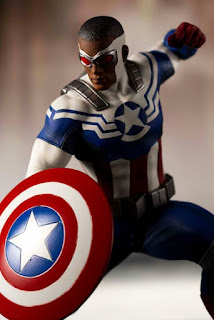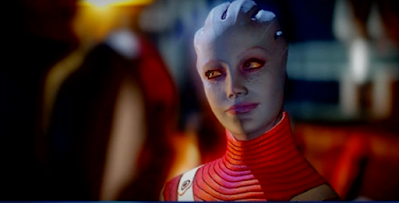The Incoherent Themes of Falcon & Winter Soldier
By Ephraim Belnap
--
Spoilers for the entire series below.
This series has good optics but doesn't seem to understand what it's talking about. I can only assume that it's borrowing material from the comics run of the same without the context that made it work a little better. But that's no excuse.
Misunderstanding #1 - Super Soldiers Are Bad
Totally wrong. The argument for that paltry statement is that the desire to be superhuman plays into eugenics tendencies, but it doesn't do that at all. Serum makes you super-strong, but that doesn't play into eugenics or Nazi ideology. It's a pure coincidence that the first super-soldier had blond hair and blue eyes. And so far as we know, super-soldier heritage isn't inheritable. We have no examples from Steve, but Isaiah Bradley in the show appears to have a grandson who DOESN'T have his powers, and the few examples from the comics are fifty-fifty. Inheritable traits don't get inherited all the time, which is part of why eugenics are a terrible ideology long-term.
Framing super soldiers as an expression of eugenics totally mischaracterizes the purpose for it (in-universe and out-), which is to create superpowered characters that can take on extraordinary threats, the need for which was showcased in this episode. Steve Rogers took down Batroc inside of 30 seconds, but Sam Wilson needs to spend 2 minutes fighting and failing to actually win before just bailing, then can't beat Karli in a fistfight and needs to be rescued? Total blow-out. Total misunderstanding of the ideologies, and kind of a bummer. Part of me thinks the comics did this so they wouldn't have to permanently empower the character, but that's something the show could have easily done since it's not saddled with forty years of continuity to fit into!
Misunderstanding #2 - John Walker Is Bad
Is he? The show completely failed to walk this through. He's bad because he takes the Captain America role, but then the very first scene of the second episode is showing him being reluctant to, having an interracial girlfriend, a black best friend, being an all-around great guy by appearances - all coding meant to signify that he's a good, competent American man stepping into a role that he didn't fully ask for, and that he doesn't understand as an implicit betrayal of Sam's intentions. Then the next episode makes him inexplicably incompetent, even though everything before that suggested otherwise, then he's flanderized into some ineffective rube who can't keep up, who then takes the super soldier serum to compensate for it (tying into the super soldier issue), even though we don't even see him taking it! Was there a scene cut from the episode? Without that delineation, it was very hard to tell if he was now powered up or simply exhibiting the Hollywood toughness all the non-supers have.
And then he kills a guy, so he's bad, but then he shows up in the last episode as basically a good guy who shows restraint and gets the bad guys captured but then in the last scene he's suddenly a pawn of the military with no morals again?? The signaling is very mixed. I'm half-convinced there was a scene cut of him popping Xanax in private because the pressure is getting to him, explaining his sudden erratic behaviors and incompetence. There's a whole lot of ways it could've shook out, but they went with this?
Misunderstanding #3 - The Racism Angle
I'm gonna break this down - Sam didn't become Captain America because he thought there were too many racists who'd resist it, but then talking to Isaiah Bradley made him realize he should try anyway to honor his sacrifice? That's the most coherent way I can put it, but the show didn't link this as cleanly as that, even to people in the know. This ties in with the eugenics question once again, because somehow it's framed as bad for Sam to take the serum because he'll think he's better than other people? Even though everything about him suggests otherwise? Zemo's a fool to think that, and hardly a credible opinion. And trying to prevent a different type of person from existing because you think they're inherently bad has a specific term. It doesn't have a moral justification. If anything, Sam taking the serum would mean the opposite, because it would be taking something perceived as being supremacist and giving it to someone who would be anything but. All this to say, they're right - and bold - to talk the racism angle, but they muddle it up so much with the super soldier question and the evil government angle (see John Walker) for it to be really clear. Dang.
Misunderstanding #4 - Karli Morgenthau Is Good But Also Bad
This is really another Legend of Korra situation - when you make the villains a bunch of terrorists fighting for their rights, you can't legitimize their claims and have them actually being terrorists. The minute they start killing innocent people, they become strawmen, and the arguments become facile. Notice how X-Men: Days of Future Past juggled the same question. The one extremist character teeters on the edge of murderous terrorism the whole movie, so when at the very climax she chooses not to, it's an enormous relief and one backed up by the film's worth of character work. But it draws the question out for maximum suspense, maximum ponderance of what really constitutes the limits of world-changing, and most importantly makes us empathize with her, so her issue is now legitimate.
Similarly, the show seems to come down on the side of non-violence; that trying to murder the world into aligning with your beliefs is a futile one, and one Karli was wrong to follow, but she doesn't get a chance to turn that around, and dies before she can change her ways and while her friends are trying to carry out her murder plan! If the writers had pondered DoFP a little more they might've really come out on top here. She should've been Bad-Seeming But Actually Good in the end, and made the choice to abort because of conscience. Instead, she's killed off unceremoniously so we can avoid the question they brought up by having her randomly kill innocents in an earlier episode. Disappointing.
Misunderstanding #5 - The Military Is Bad But Also Not
Marvel doesn't want the military to actually be like the military - it should show up when you need people to get super-powers or for some cool guys with guns to show up, but that's it. But actually trying to discuss it more in-depth in this show just created a bunch of narrative jumbles. The Military Is Bad because they gave the shield to someone else, betraying Sam's intentions in giving it to them. And it keeps on enabling that. But also, Sam works for the military; that's what he's doing in his very first scene. And Bucky still works with them too; they let him past security checkpoints because of his clearance, and they give him a pardon because of his service. They're both inextricably tied up with the military; they're just not usually beholden to it they way John Walker is. And that's of course fiction, because military personnel are always beholden to the military in a number of ways. Sam brushes off working with Walker because they have to have "limits" and "rules of engagement", but every single military member has to have those! It's like saying you don't want to make a dessert pie with someone because they'd want the pie to have filling and sugar (or a sugar additive).
With the show ping-ponging between the military being good or bad (with Walker helping that), I'm unsure if the military is supposed to be evil in most occasions or complicated or just a super-power-/personnel-dispensing device to come and go as an episode needs an antagonist/benefactor (see how confusing that sounds?).
Misunderstanding #6 - World Governments Are Evil Because Refugees
Tying into the military question, the way it approaches refugee issues is hazy as heck. Tying into the Karli question and the military question and the John Walker question and the general universe, it seems to use the plight of refugees as justification and world-building and table-setting, but then doesn't really engage with it? I understand it's got to stay on-task, but it's unclear if it really ever wanted to talk about this. The expected conclusion we got was that they came down on the side of refugees, which is thematically on-point, but it fails to really elaborate why, or on the arguments against them. Falcon basically just tells them "figure it out!" and offers no insight into this sort of thing. The straightforward-seeming solution would be to attack the lack of resource distribution that the Flag Smashers were compensating for, but they somehow totally forgot about that. That would seem like a nice middle-of-the-road angle, since it would address corruption and/or negligence on the governments' part while also not taking the terrorists' side. Once again, the show's unwillingness to engage with all of its moving parts creates problems. But that's how it goes.
--
Overall, the show's good. It talks about some big issues; it lets characters be the focus instead of plot twists or mystery boxes (AKA the death of good drama). It feels based in real moments - more so than any other peer. It lets the story unfold with its trademark mix of action and exposition. It uses its cast to the fullest and sets up some interesting future stories. But it would be nice if it had understood itself better and made itself heard more clearly.








Comments
Post a Comment